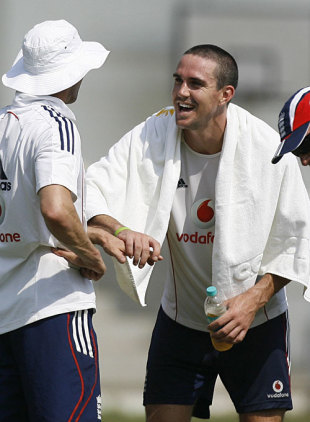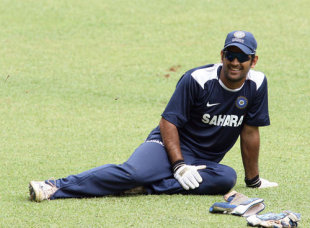
|

Kevin Pietersen: a self-made man, an entrepreneur in the most literal sense
© AFP
|
|
The first time English audiences took a proper look at Mahendra Singh Dhoni,
the light in which he was cast was not remotely flattering. The venue was
Mumbai, the occasion was the final day of the decisive
third Test of the 2005-06 tour. A tenacious England, led by Andrew Flintoff (and inspired by
Johnny Cash), had pushed their more fancied opponents to the brink of
defeat. Dhoni, in only his ninth Test but with Yuvraj Singh for company, had
a chance to dig for the series-winning draw and cement his place in the team
for the foreseeable future.
Instead he opted to make the name of another rookie, England's Monty
Panesar, in one of the most farcical passages of play imaginable. In the
space of three balls Dhoni twice charged at Shaun Udal and produced
carbon-copy miscues that spiralled off the leading edge to long-off. The
first was hideously misjudged by the hapless Panesar, who allowed the ball
to land unchallenged five metres to his right. The second, however, was not,
and as an English cult hero was born there and then in the outfield, an
Indian pantomime villain departed by the side exit to peals of mocking
laughter.
The following day, the Sun referred to him as "Mahendra Singh
Doughnut", which pretty much summed up the prevailing opinion. Here was just
another fancy-Dan cowboy cricketer with a flashy haircut and a penchant for
bombastic hitting, who was sure to drown in a sea of his own hubris.
Instead, three years on, Dhoni is not merely hitting the ball as hard and as
far as ever, he is also the uncontested leader of one of the finest Indian
teams in many a vintage - world champions in the shortest format of the
game, and quite possibly the best on show in the longest as well.
Which just goes to show what a nonsense first impressions can be. As it
happens, Kevin Pietersen was also playing in that contest, another man whose
up-front demeanour invited a raft of preconceived notions. Like Dhoni, admiration of his
ability to produce ludicrously brilliant strokes was tempered by the
assumption that he was always one false move from getting his comeuppance,
and sure enough, there have been numerous occasions when his judgment has
invited condemnation - most recently against South Africa
at Edgbaston last
summer. But instead Pietersen too is now a leader, and by all accounts a
very fine one at that. At Rajkot today, and for six weeks thereafter, the
pair will be pitted against one another in a clash of unlikely equals.
By the culmination of England's tour at least one 100% record as Test captain will have fallen. It is a
misleading statistic but an instructive one - Pietersen has one win from
one, against South Africa
at The Oval last summer, Dhoni three from three, though none yet consecutively. It is hard to recall a series that has pitted
two such greenhorn skippers against one another, and yet it is equally hard to imagine that any two rookie captains can have come across as such perfect fits for the job.
So much for experience being the ultimate factor in selecting leaders of men. Pietersen, the more abrasive of the pair in his junior years, was never trusted in authority until England came calling, and admitted his prior
captaincy experience was "zilch". Dhoni, as an interloper from the backwaters of Jharkhand, was barely any better prepared for office. But in both instances the character of the men has carried them way beyond the barbs
that are attracted in their position, which is incredible when you consider the status of the men they have succeeded - Michael Vaughan, the most successful Test captain in England's history, and Anil Kumble, whose
slow-burning brilliance made his brief time at the helm hugely popular.
| |
|
|
|
| |
| At the outset of their careers Dhoni and Pietersen both gave the impression that they were men in a hurry, and their statistics in limited-overs cricket are revealingly similar. But now that they've arrived at their respective pinnacles, their overwhelming message is one of calm authority |
| |
At the outset of their careers Dhoni and Pietersen both gave the impression that they were men in a hurry, whether it was the love of motorbikes on the one hand, or the (now tempered) fondness for bling on the other, and their
statistics in limited-overs cricket are revealingly similar (both average 47 in ODIs, but only 24 and 27 respectively in the helter-skelter atmosphere of Twenty20s). But now that they've arrived at their respective pinnacles, their overwhelming message is one of calm authority, and it's been readily transfused throughout their teams.
And yet, once again, the perception perhaps deviates from the truth. The most remarkable thing about the two players is not how rapidly they've managed to temper their instincts to meet their new roles, but how utterly
ordinary they were in the first place. Dhoni's equanimity is aided by his provincial upbringing and the consequent anonymity of his years in the youth ranks. He was not a trailblazer in the mould of Sachin Tendulkar, Virender Sehwag, or even his rival for the gloves, Parthiv Patel, who was 17 going on 12 when picked for the Trent Bridge Test in 2002. Instead Dhoni was 23 when he made his first international appearance in December 2004, a grizzled veteran by Indian standards.
As for Pietersen, the tale of his transformation from an offspinning No. 9 for Natal is oft-repeated. Back in 1999, the year he decided to throw in his lot with South Africa, his only world-class attribute was his unshakeable
self-confidence - a fact that Nasser Hussain remarked upon during England's tour that winter, when Pietersen collared him during a warm-up match to ask for a trial with Essex. Like Dhoni, he is a self-made man - an entrepreneur in the most literal sense. He has got to where he is today after huge personal investment and risk - transferring one's nationality on a whim, at 20, is quite some leap of faith. It is all the more reason why he is so
comfortable now that he's been saddled with the ultimate responsibility.
By the end of the year the personality traits of the two captains will have
become all the clearer, and no doubt there will be one or two hands reaching
for knife-hilts if the margins in either series are too wide for the media's
comfort. But from what we've already seen of the two men in action, it is
safe to predict that they will grow in their roles and endure long into the
future. For as Graeme Smith warned when Pietersen took over from Vaughan, it
is not the victories that shape a leader but the setbacks - the "bumps on
the head" as he termed them. And already it's clear that both men have a
control over their emotions that will serve them proud when the moment to
front up arrives.
It's safe to say that Pietersen's first "bump" was avidly awaited by the
English media. A maiden Test triumph and a 4-0 rout of South Africa were just
too cushy for some. But when the moment arrived, on a humiliating and costly
evening
in Antigua two weeks ago, it has to be said he fronted up magnificently. He was gracious, honest and happy to share in the joy of his newly minted opponents, even if some of his comments about "not needing the money" were not reported in quite the spirit in which they were uttered.
Dhoni has yet to suffer a bump quite so high-profile, though there is every
reason to believe he'll take the moment in his stride as well. His demeanour
at the moment of victory - a regular occurrence of late - suggests as much:
from his impassive reaction as Misbah-ul-Haq holed out at the World Twenty20
final last September, to his instinctively thoughtful gesture as Australia
succumbed to a record defeat in Mohali last month, when he took the stump he
had claimed for himself and handed it to the centurion and soon-to-be-retired Sourav Ganguly.

|

Dhoni: remarkably equanimous, and no longer a fancy dan
© AFP
|
|
That gesture aside, Dhoni's attitude to the senior men in his dressing room
is markedly different to that of Pietersen's, although through their differing
approaches the pair actually achieve the same objective. Deference to one's
elders is a trait that binds Indian society but weakens its sporting teams,
for rare is the man who has the courage to upset the pecking order. Dhoni
has no issue with bruising egos for the greater good, as he showed when he
promoted himself up the order at Mohali - ahead of Tendulkar, Rahul Dravid,
Ganguly and VVS Laxman - to pursue quick runs and force an aggressive
declaration.
Pietersen's approach, on the other hand, has been far more conciliatory -
the love he pumped into the air at The Oval was tangible, because in his
estimation egos are there to be massaged (and, let's face it, he should
know). Whatever the logic behind his strategy of timely bear-hugs and
morale-boosting text messages, the upshot has been impressive. Flintoff is
happier than he has been since the 2005 Ashes, and so too is Steve Harmison,
who was coaxed back from the brink of retirement in the most resounding
endorsement of the new regime. With those two fit and firing, England can
take on the world. And because Pietersen knows it, he's not afraid to go out
of his way to ensure it.
The world awaits for both of these leaders. They are flushed with recent
success, and further buoyed by the natural optimism that is generated at the
start of long journeys. They are two men who began as outsiders, but who
have worked their way to the summit through talent, tenacity and sheer good
timing - and not allowed the rare deluges of doughnut-bearing headlines to
deflect them from their objectives. If the remainder of their stories are
half as interesting as their beginnings, then England and India will be well
served in the coming years.
Andrew Miller is UK editor of Cricinfo

